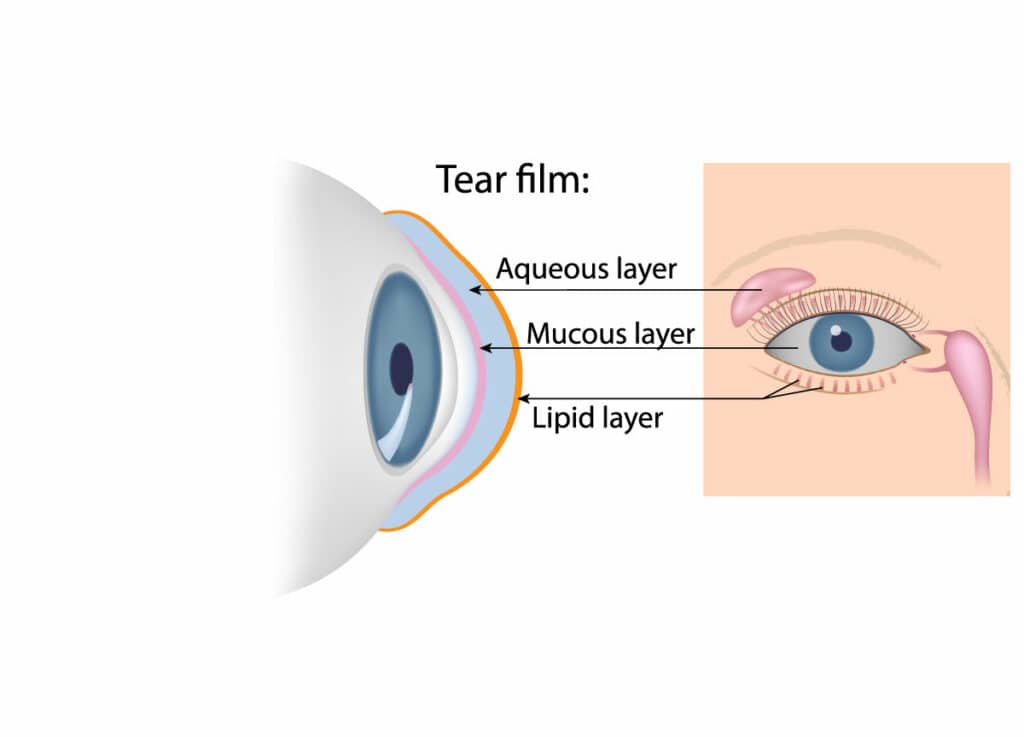Dry Eye Syndrome
Dry eye syndrome is a common and often uncomfortable condition that affects millions of people worldwide. It occurs when your eyes don’t produce enough tears or when the tears evaporate too quickly.
At Wooster Eye Center, our eye doctors understand the impact dry eye can have on your daily life and are committed to providing comprehensive care to help improve your symptoms.
What is Dry Eye Syndrome?
Dry eye syndrome, also known as dry eye disease, is a complex eye condition that affects the tear film of the eyes. Your eyes require a constant layer of tears to maintain comfort and clear vision.
This tear film is composed of three layers: an oily outer layer, a watery middle layer, and a mucin inner layer. When there’s an imbalance in this delicate system, either due to decreased tear production or increased tear evaporation, dry eye syndrome can develop.
The condition can range from mild and occasional discomfort to a chronic problem that significantly impacts quality of life. It’s important to note that despite its name, dry eye can sometimes cause excessive tearing.
This occurs when the eye, sensing dryness, overproduces tears as a reflex action. However, these reflex tears are often of poor quality and don’t adequately lubricate the eye.
What Are the Most Common Symptoms of Dry Eye?
Recognizing the symptoms of dry eye is crucial for early diagnosis and treatment. While the experience can vary from person to person, common symptoms include a stinging, burning, or scratchy sensation in the eyes and the feeling that something is in your eye, known as a foreign body sensation.
Many people with dry eyes also experience redness of the eyes and increased sensitivity to light. You might also notice blurred vision, especially when reading or using a computer for extended periods.
Some people find it difficult to wear contact lenses comfortably or experience challenges with night driving. These symptoms may worsen in certain environments or activities, such as in windy or dry conditions, during prolonged screen time, or after long periods of reading.
If you’re experiencing any of these symptoms persistently, it’s important to consult with an eye care professional for a proper diagnosis and treatment plan.

What Causes Dry Eye?
Dry eye syndrome can be caused by a variety of factors, often working in combination. Understanding these causes can help in both prevention and treatment.
Age is a significant factor, as your eyes naturally produce fewer tears as you age. Dry eye is particularly common in people over fifty, especially women going through hormonal changes.
Several medical conditions can affect tear production, including rheumatoid arthritis, diabetes, thyroid disorders, and lupus. Additionally, certain medications can reduce tear production as a side effect.
Also, increased screen time is a common cause of dry eye. The first step your eye doctor will take is determining the underlying cause of your dry eye.
This is crucial for developing an effective treatment plan. At Wooster Eye Center, our eye doctors conduct thorough examinations to identify the specific factors contributing to your dry eye symptoms.
What Happens if Dry Eye is Not Treated?
While dry eye might seem like a minor inconvenience, leaving it untreated can lead to more serious complications. The surface of the eye relies on a constant layer of tears to stay healthy and to allow you to experience clear vision.
Without this, several issues can arise. One of the primary concerns is an increased risk of eye infections.
The tear film plays a crucial role in protecting the eye from bacteria. With inadequate tear coverage, the eye becomes more susceptible to infections.
In severe cases, dry eye can lead to damage to the cornea. This can manifest as inflammation and abrasion of the cornea’s surface, potentially resulting in corneal ulcers or scars that could impact vision.
In some cases, untreated dry eye can lead to vision problems. While typically temporary and reversible with treatment, this shows the importance of addressing the condition promptly.
Are you experiencing symptoms of dry eye? Schedule an appointment at Wooster Eye Center in Wooster, OH, today!

